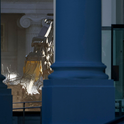The Lords test
Dear Lord Cranborne,
At the end of the summer recess you and I have rather different prospects to look forward to during the coming parliamentary year. You have to lead the overwhelmingly superior forces of Conservative peers in responsible opposition to a Labour government elected with an equally decisive majority in the Commons. I, as one of a handful of hereditary peers to take the Labour whip, will need to find a way of supporting the government against the huge forces that you can mobilise, at the same time as pursuing a full-time business career.
I therefore look forward to the reform of the House of Lords with double anticipation: to see the long overdue addressing of a democratic nonsense and, more selfishly, in the hope that managing my own life will thereby become simpler.
In the period since the general election you have already given several interviews on Lords reform. These have repeated the point you made before the election-that you were open to the principle of reform, while strongly attached to the virtues of a hereditary element ("an important ingredient in our success," you said in the House one year ago).
I am not sure I understand how these positions can be reconciled. I should have thought that any reform would entail the elimination of the hereditary element, on the grounds that it is incompatible with simple principles of electoral democracy. I was struck by a letter written in 1910 by Lord Robert Cecil (your grand-uncle, I think) to Walter Long, a fellow MP, in which he wrote: "Personally I do not think that any system short of an admission that no one should sit in the second chamber except on his own merits would be satisfactory."
Written by a leading "Ditcher" during the bitter campaign to forestall the reform of the Lords introduced by the Parliament Act of 1911, this is a surprising comment. Yet it serves as a good guiding principle for the second chamber's composition.
As you have pointed out, the reform of the Lords may have implications for its relationship with the Commons-which is precisely why we believe that the ultimate composition should be carefully considered and debated. The first step, of abolishing the right of hereditary peers to take part in the proceedings of the House, is not (as you have suggested) "idiotic," but a completely justifiable move to eliminate the aspect of the second chamber which is most repugnant to many people's democratic sensibilities. At the same time we must create a political balance in the House which-without removing a strong independent element and vigorous critical scrutiny of the government's legislation-reflects more fairly the popular support for the parties.
"The question is," said Lord Selbourne in 1911, "shall we perish in the dark, slain by our own hand, or in the light, killed by our enemies." Despite the efforts of the "Ditchers," common sense prevailed at that time and the Lords themselves (narrowly) accepted the compromises and reforms contained in the Parliament Act. I hope that you and your colleagues in the shadow cabinet might think that this is an instructive precedent and give your party's support to the progressive reform of the second chamber which the result of the general election so clearly endorsed.
Yours sincerely,
Tom Chandos
28th September 1997
Dear Lord Chandos,
I am glad to see that, while the hereditary peerage exists, you feel an obligation to support your party in our House, but I would be sorry if any reform returned you to an exclusively business life.
I must temper such regret with a reaffirmation of what you rightly describe as my openness to reform. My quarrel with your party's proposals is not over the principle of reform, but over how you want to go about it.
It seems to me that parliament as a whole is suffering a crisis of au-thority. The House of Commons is held in public contempt. I am not sure, in spite of your party's best efforts, that the same is so universally true of the House of Lords. I suspect that, as so often with public opinion, there is a good reason for this. Since the middle of the 19th century-thanks to the growing efficiency of the government whips and as long as there has been a government majority-the House of Commons has increasingly become the executive's poodle. Now that the lower house consists of professional politicians, with rare exceptions such as Tam Dalyell, it is difficult to see how the power of patronage can be defeated.
It is thus all the more important to establish a strong and independent second chamber which can stand up to the elected dictatorship of the House of Commons, particularly when a government becomes unpopular. The present House of Lords is admirable in many ways-especially as a technical revising chamber, as an influence on the preparation of legislation and as a forum for debate. But although it does provide the only element of amateur independence in parliament, it does not believe that it has the authority (except occasionally and on minor matters) to ask the lower chamber to think again-let alone to push a dispute between the two Houses so far that the electorate would have to be asked to resolve the conflict. This, not the existence of the hereditary peerage, is the real argument for reform of the House of Lords.
I must persist therefore in calling your party's two-stage plan for reform idiotic. It shows no understanding of the complex relationship between the two Houses, or between the two Houses and the government. If parliament is to be reformed it is no good attacking the problem piecemeal. By removing the hereditary peers as a first step you would remove the last element in the current parliament that does not exist by virtue of party patronage. The House of Lords would consist wholly of appointed peers until the government could agree on what stage two of the reform should be.
History does not suggest that such an agreement would be easy. During the last 100 years there has been almost universal consensus that the Lords should be reformed, including, as you point out, my own grand-uncle Bob Cecil. The trouble has always been to agree on how to do it. Producing such an agreement takes time. Meanwhile the ermine-clad quango which the government will have created by abolishing the hereditary peers' right to sit will have become an accepted part of the constitution. The present House of Lords does not bark often, but a government which says it disapproves of the abuse of patronage will have created a secondary parliamentary poodle to match the elected chamber.
Why does your party not do what I suggested some time ago: set up a House of Commons select committee to examine the composition and powers of both houses of parliament? In every other field the government has been notably keen on reviewing present arrangements before deciding what to do. I suppose they think their present approach is a bone to throw to their left wing. It is a pity that a cavalier approach to parliament is the price to be paid.
Yours sincerely,
Robert Cranborne
29th September 1997
Dear Lord Cranborne,
I am amused to find myself-a former member of the SDP-advocating an approach to constitutional reform which you suggest is a sop to my party's left. But I must put you in touch with some of your party members and supporters who have expressed to me their agreement with our proposed change to the rights of hereditary peers. It would be a mistake to think that there is not widespread popular support for such a move, across parties and throughout the country.
I am always uncomfortable with comparisons between an "admirable" House of Lords and a House of Commons which is "held in public contempt." I cannot avoid the partisan suggestion that if the Commons is held in public contempt (which I do not actually believe), certain members of your party have played a disproportionately large role in this regard. The election of Martin Bell as independent MP for Tatton (providing at least one element in the current parliament that does not exist by virtue of party patronage) seems to reflect this.
I do not believe that the activities of the government whips or the power of government patronage need lower the esteem in which the public holds parliament in general or the House of Commons in particular. Most people are familiar in their own lives with the balance that needs to be struck between collective responsibility and independent action, whether at work, at home or elsewhere. Many formidably independent MPs remain in all the parties-was your time as a whip in the Commons entirely taken up with combing the parliamentary poodles of the elected chamber?
I have never felt that the exist- ing life peers on either side of the house were any more compliant at the hands of their whips than their hereditary colleagues. To bracket "independence" with "amateur" and to paint a House of Lords without hereditary peers as an "ermine-clad quango," insults existing life peers and (in respect of potential new nominees) men and women of distinction from many walks of life. The welcome initiatives of the Chancellor of the Ex-chequer on the dress code could always be extended to the second chamber, if you or your colleagues have problems with ermine.
There is no case for delaying the first stage of our proposed reforms, because the electorate has expressed its strong support for our proposals. A second chamber comprised sole-ly of nominated members (inclu- ding a substantial body of cross-benchers) need be no less effective and would be significantly more legitimate than the existing House of Lords.
Your advocacy of a select committee seems entirely appropriate as a means of considering the next stage of reform, which we agree is a complex issue. I am intrigued, though, by the implication in your letter that a fully reformed House of Lords should have increased authority over the Commons.
In contrast, you said in the House last July: "But perhaps the hereditary peers' most valuable contribution of all is that a house comprised as ours cannot legitimately challenge the ultimate authority of the elected chamber. Paradoxically, therefore, our very weakness contributes to the organic strength of parliament."
Could this change of view by any chance be related to the fact that last July there was still a Conser-vative government with the vestiges of a majority in the Commons, whereas now there is a Labour government with a strong majority in the elected chamber?
Yours sincerely,
Tom Chandos
29th September 1997
Dear Lord Chandos,
Sadly, the government whips office in the 1980s did not think me sufficiently compliant to ask me to join them. I have never been a whip.
But I am aware that a number of peers who take the Tory whip would like to end the right of hereditary peers to sit in our House. I have yet to meet one who agrees with your party's two-stage approach.
You are right in implying that reprehensible behaviour is not confined to the Labour party in Paisley, Glasgow Govan or Doncaster. Some Tory MPs certainly did their bit in the last parliament to bring the House of Commons into disrepute. You and I can agree on that.
We can also agree that we need to strike a balance "between collective responsibility and independent action." You are clearly content with the present balance of power between parliament and executive. I am not. Equally, the independence of MPs seems to decline as the government's majority increases.
I also agree that many life peers are by definition independent as well as distinguished. The same could be said of many so-called "working peers." Yet a large increase in the proportion of working peers in the Lords would not increase their independence from their political parties. If, after the first stage of reform, the House reflected the broad balance of the parties at the last general election-as the foreign secretary has suggested-its independence from the government would not be easily preserved either.
(Incidentally, you need only 24 hours as leader of the House of Lords to understand what otherwise sane and successful men will promise in exchange for a peerage. Please do not underestimate the power of patronage.)
You rightly see that any reformed House of Lords will have more authority than the existing chamber. It would therefore feel able to exercise its powers more fully than the present house. Our relationship with the House of Commons would change and the balance of power in parliament would also change. This might be a good thing, but it would change the current, settled balance. The fact that the present relationship is settled does indeed, as I said in July 1996, contribute to the organic strength of parliament. If you want to change this you should look at parliament as a whole before beginning to tinker bit by bit.
Yours sincerely,
Robert Cranborne
1st October 1997
Dear Lord Cranborne,
I cannot pick up all the points you make. I will, however, try to address again the central argument-something my party has done, in striking contrast to your own, whose inattention to Lords reform over the past 18 years implies a high level of satisfaction with the status quo (not surprising in the light of the massively skewed political balance of the present House).
Delaying any change to the second chamber's composition until there has been a comprehensive review of parliament as a whole is an invitation to prolong the decades of inaction which you referred to in your first letter. Meanwhile the legislative programme of the government, newly elected by a decisive majority, is at the mercy of how you and your colleagues choose to deploy your massive (hereditary-based) majority in the Lords.
Through its endorsement of our manifesto the electorate has shown that it does not believe that, at the end of the 20th century, a second chamber predominantly composed of hereditary peers is the most appropriate check on the House of Commons and the executive.
A House of Lords composed solely of nominated members, with a cross-bench element, will provide the degree of accountability that-until there is agreement on a wholly or partially elected House-the electorate wishes to see. Nominations should, as the foreign secretary suggested, reflect the broad balance of the parties, as nominations for working peerages have done for years. It is not where I hope or expect reform to end, but if it was and became, as you suggested, "an accepted part of the constitution," it would be unequivocally better (and closer to the electorate's wishes) than the present position.
Throwing around emotive and essentially meaningless words like quango should not obscure the validity of this argument.
Yours sincerely,
Tom Chandos
2nd October 1997
Dear Lord Chandos,
If the ejection of the hereditaries is so urgent, why did your party not introduce a bill in the first session of parliament?
What I propose is not a delaying tactic. Rather, it recognises something which this government has shown it cares little for: the central place that parliament should occupy in the life of this country. Any reform should therefore be addressed with care.
You also seem to have a pre-1945 view of the House of Lords' willingness to frustrate the policies on which this government was elected. I made it clear at the end of last year that the Salisbury-Addison rules now seem to enjoy the force of a constitutional convention. The rules were originally only an agreement between two party leaders in our House that the Lords would not vote against the principle of legislation which embodied policies foreshadowed in the Labour Party's 1945 manifesto. I have made it clear that I regard my party as being bound by a similar undertaking. I therefore find it difficult to un- derstand how you can argue that "the government, newly elected by a decisive majority, is at the mercy of how (I and my colleagues) choose to deploy (our) massive (hereditary-based) majority in the House of Lords." Like the fat boy, you really only want to make your supporters' flesh creep.
Incidentally, unlike in 1945, there is no Tory majority among those peers who attend the House of Lords. We have found it difficult to defeat this government without cross-bench support, and Tom Strathclyde will tell you that there is no guarantee that Tory peers who do turn up will vote for the official position. It is one of the difficulties business managers experience in handling an independent House.
You might also like to consider how advisable it would be to take all or part of the committee stage of constitutional bills off the floor of the House of Commons. When the late Lord Attlee and his colleagues expanded the use of standing committees after 1945, they made an exception for constitutional legislation. In view of the ability of both front benches to pack standing committees, this was a sensible constitutional safeguard by a radical government which appreciated the importance of the supremacy of parliament over the executive. The present Lord Chancellor said last year-from the opposition front bench-that he agreed with the principle of that supremacy. I hope that the expediency of holding office has not led to his sensibilities being trampled on.
Certainly, to judge from your last letter, your visceral dislike of the right of hereditary peers to sit is blinding you to the wider issues. Looking over this correspondence, you do not seem to have answered any of my points. You do not even explain whether you think the present House is effective. You merely rest your case, as do so many men of the left, on the belief that if something is wrong in theory, it must be wrong in practice.
Yours sincerely,
Robert Cranborne











